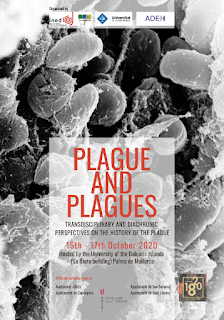CfP: Peste y pestilencias. Perspectivas transdisciplinarias y diacrónicas de la historia de la peste

La Asociación de Demografía Histórica, organiza conjuntamente con la red IN-HOPPE -International Network -Historical and osteoarchaeological Past Populations Exploration-, y el Grupo de Investigación de Historia de la Salud de la Universitat de les Illes Balears, un coloquio internacional, transdisciplinario y diacrónico sobre la historia de la peste desde la perspectiva de los avances recientes en historia, arqueología, epidemiología y biología molecular . La peste es una infección, a menudo irreversible, debida a la bacteria Yersinia pestis. Esta bacteria afecta a las poblaciones humanas y sus episodios a veces muy violentos han generado uno de los más temidos azotes en la Historia. En una acepción más amplia “peste” también señala toda forma de enfermedad contagiosa y altamente letal. En las fuentes medievales y modernas los términos “peste”, “pestilencia”, “contagio”, equivalen a epidemias, aunque estas no son necesariamente atribuibles a peste. Es por ello que...
